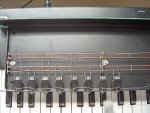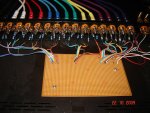I had the privilege of talk to the justice league mix engineer , Edward Nixon and he swears by it. Also so does Manny Marroquin from the hit factory.
This is a very light weight "argument". The old school engineers have the most difficulties with the matter. They learned their craft in a time were all available tools were either physical or electronic. Both worlds are still not fully understood until today, so audio engineers were used to use their instincts, artistry and hard learned experience to work with these kinds of tools. Many never had any education in the digital context and approach the topic with their old philosophies (which are perfectly fine for the analogue world).
The problem is, the digital world is totally counter-intuitive (something musicians and artists don't like at all

). But its effects can be fully understood mathematically (something that isn't possible in the analogue domain), which simply means that you can't argue about it. No hidden mojo magic.
Even people like George Massenburg and several other of the most respected audio engineers/gear developers have (had?) obvious difficulties to understand most basic concepts like the nyquist/shanon theory. These stupidities are well documented all over the web in several articles (I hope he learned a lot in the meantime

), music magz are full with this nonsense too...
...and this is exactly the kind of misconceptions I am talking about:
but there are other benefits such as headroom and depth
Well, you must be a very optimistic person if you call these things benefits.
The digital world has either no headroom at all or unlimited headroom, depending how numbers are represented internally. You can't improve it. Impossible. But with an analogue summing with extra DA/AD loop, you can increase the noise for no reason, increase distortion and fvck up the stereo image because of crosstalk effect, you also reduce the bandwidth and thus distort the phase and weaken the transients. Not enough, the mandatory extra DA/AD will also introduce all the above + quantization and most of all aliasing distortion.
This is what you hear when using passive analogue mix boxes. You hear the "weaknesses" of your infrastructure. Of course, such an effect is sometimes exactly the right thing. But in this case, I recommend you to simply "insert" analogue processors that actually do something useful and not mess with the heart of your core infrastructure and workflows. This warming effect has nothing to do with the passive analogue mix stage, it's all about the surrounding signal path.
Just look inside these boxes. You'll see nothing, nothing, a dozen wires connected together with a simple resistor and they nothing again. 2000$ WTF!
The thing is digital is just 1's and 0's it doesnt know anything else so sometimes you can lose certain frequencies when summing to a two track.
Well, the analogue world is only made of electric state and the dozen wires mentioned above. You can be certain they don't know much about your music either. It's cheap plastic and copper.
And no, digital summing is perfectly flat, you don't lose anything (but analogue summing does).
Thing is, digital music signals are neither stepped nor are they restricted to 0 or 1. But it's too easy to fool people with sh!t in the audio scene.

 ). But its effects can be fully understood mathematically (something that isn't possible in the analogue domain), which simply means that you can't argue about it. No hidden mojo magic.
). But its effects can be fully understood mathematically (something that isn't possible in the analogue domain), which simply means that you can't argue about it. No hidden mojo magic.
